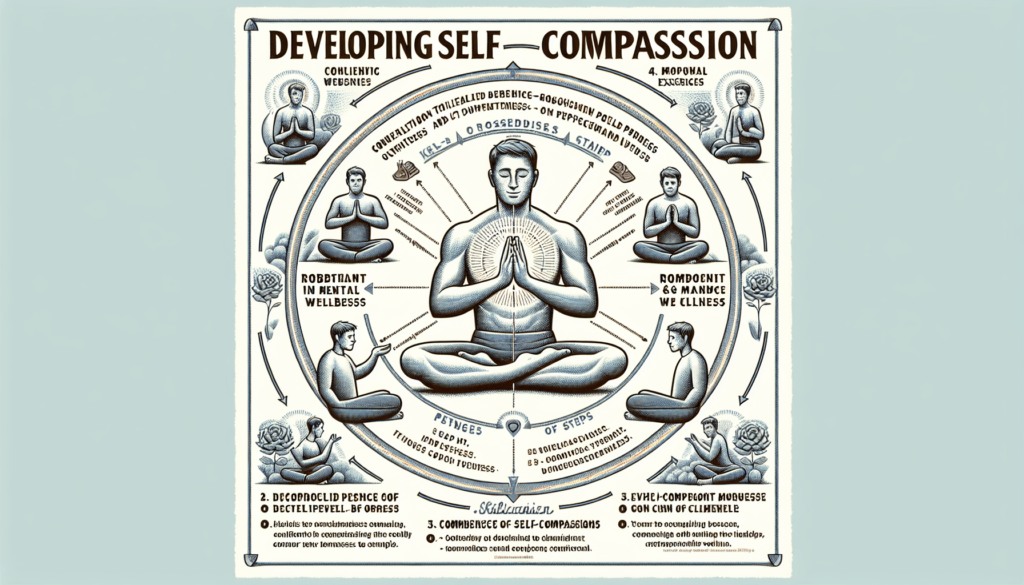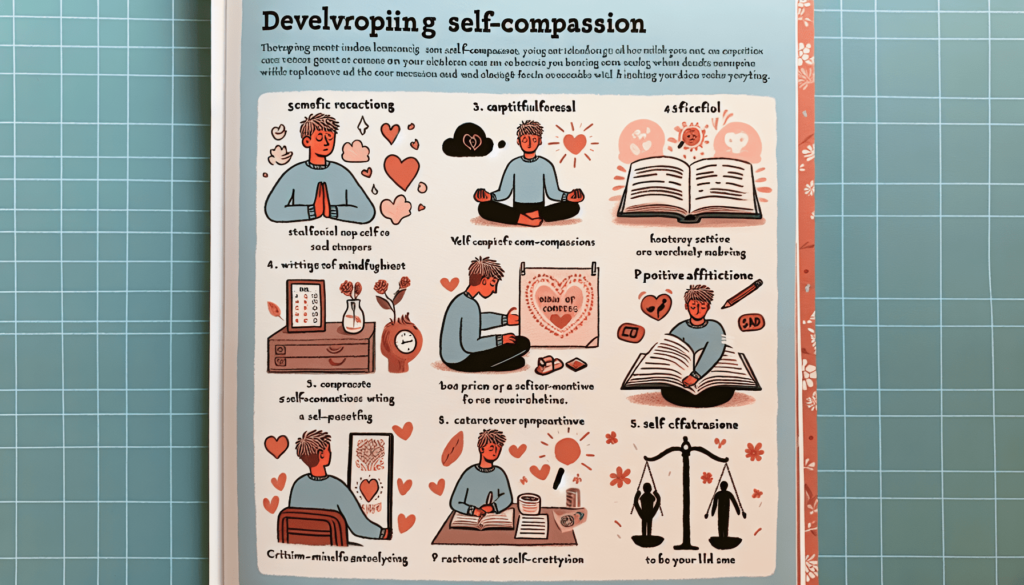In the fast-paced and often stressful world we live in, it can be easy to forget to be kind to ourselves. However, developing self-compassion is essential for our overall well-being and happiness. In this article, we will explore ways to cultivate self-compassion through various exercises. One powerful exercise is writing yourself a compassionate letter, allowing you to acknowledge your strengths and show yourself the same kindness and understanding that you would offer to a loved one. Let’s dive into these exercises and embark on a journey towards self-compassion together.
Understanding Self-Compassion
What is self-compassion?
Self-compassion can be defined as treating oneself with kindness, understanding, and acceptance, especially in times of difficulty or failure. It involves recognizing our own suffering and extending the same compassion towards ourselves that we would naturally offer to others. It is about being gentle with ourselves, acknowledging our imperfections, and embracing our humanness.
The importance of self-compassion
Self-compassion is of utmost importance for our overall well-being and mental health. When we practice self-compassion, we cultivate a healthy relationship with ourselves, boosting our self-esteem and self-worth. It helps us navigate through challenging situations with greater resilience and allows us to bounce back from setbacks more effectively. Self-compassion also plays a crucial role in reducing stress, anxiety, and depression, as it enables us to respond to our own suffering with kindness and understanding.
Benefits of developing self-compassion
Developing self-compassion brings about a myriad of benefits in our lives. It helps us develop a more positive and optimistic outlook, as we learn to embrace our imperfections, accept our mistakes, and let go of the constant pursuit of perfectionism. Self-compassion also promotes emotional well-being by encouraging us to acknowledge and express our emotions, leading to greater self-awareness and authenticity. Moreover, it fosters healthier relationships with others, as we learn to extend the same compassion and understanding we have for ourselves to those around us.
Recognizing Self-Criticism
Identifying self-critical thoughts
Recognizing self-critical thoughts is the first step towards developing self-compassion. These thoughts often manifest as harsh inner dialogue, constant self-judgment, or a negative perception of oneself. Pay attention to the language you use towards yourself and the beliefs you hold about your worthiness. It can be helpful to journal or use mindfulness techniques to observe your thoughts and identify the self-critical patterns.
Understanding the impact of self-criticism
Self-criticism can have a detrimental impact on our mental and emotional well-being. It creates a cycle of negativity and self-doubt, eroding our self-confidence and self-esteem. It can also lead to increased stress and anxiety, as the constant self-judgment creates a sense of pressure and inadequacy. Recognizing the impact of self-criticism is crucial in motivating us to cultivate self-compassion and break free from this harmful pattern.
Challenging self-critical beliefs
Challenging self-critical beliefs is an important step towards developing self-compassion. Start by questioning the validity of these beliefs and challenging the negative self-talk. Consider whether these beliefs are based on objective reality or if they are influenced by self-imposed standards or societal expectations. Replace the self-critical thoughts with kind and compassionate statements, reminding yourself of your inherent worth and the value you bring to the world.

This image is property of pixabay.com.
Cultivating Self-Awareness
Mindfulness and self-awareness
Mindfulness is an essential tool for cultivating self-awareness, which is a fundamental aspect of self-compassion. Mindfulness involves paying attention to the present moment without judgment. By practicing mindfulness, we become more attuned to our thoughts, emotions, and physical sensations, allowing us to develop a deeper understanding of ourselves and our needs.
Exploring your emotions
Exploring and acknowledging our emotions is an integral part of self-compassion. Take the time to check in with yourself and identify what you are feeling. Allow yourself to experience and express your emotions without judgment or suppression. By embracing our emotions, we validate our own experiences and provide ourselves with the compassion and support that we need.
Practicing non-judgmental observation
Practicing non-judgmental observation involves observing our thoughts, emotions, and experiences without attaching any value judgments to them. Instead of labeling our emotions as good or bad, we simply acknowledge them as part of the human experience. This non-judgmental stance allows us to cultivate self-compassion by treating ourselves with kindness and understanding, regardless of what arises within us.
Fostering Self-Kindness
Treating yourself as you would treat a friend
Fostering self-kindness involves treating ourselves with the same kindness and understanding that we would offer a friend in need. Instead of being harsh and critical towards ourselves, we extend compassion and empathy. When faced with difficulties or challenges, ask yourself, “What would I say to a friend in this situation?” and offer yourself the same gentle support and encouragement.
Celebrating your strengths and accomplishments
Part of self-compassion is celebrating our strengths and accomplishments, no matter how big or small. Take the time to acknowledge your achievements and recognize your unique qualities. Celebrate your progress and remind yourself that you are deserving of praise and recognition. By nurturing a positive self-image, you cultivate self-compassion and reinforce your self-worth.
Practicing self-acceptance
Self-acceptance is a powerful component of self-compassion. Embracing all aspects of ourselves, including our flaws and imperfections, allows us to love and appreciate ourselves unconditionally. Practice accepting yourself just as you are, with all your strengths and weaknesses. Embrace the idea that you are enough, just as you are, and cultivate a deep sense of self-compassion rooted in self-acceptance.

This image is property of pixabay.com.
Writing a Compassionate Letter
Purpose and benefits of writing a compassionate letter to yourself
Writing a compassionate letter to yourself can be a transformative practice in cultivating self-compassion. The purpose of this exercise is to express kindness, understanding, and support towards yourself. By putting your thoughts and feelings into writing, you create a tangible reminder of your worthiness and the compassion you deserve. This practice can boost self-esteem, foster self-acceptance, and provide comfort during challenging times.
Steps to writing a compassionate letter
To write a compassionate letter to yourself, find a quiet and comfortable space where you can reflect without distractions. Begin by acknowledging your struggles and offering yourself words of kindness and encouragement. Validate your pain and assure yourself that you are worthy of love and compassion. Express gratitude for your strengths and qualities, and offer forgiveness for any perceived shortcomings. End the letter with a message of self-acceptance and a reminder of your inherent worth.
Reflecting on self-compassion in the letter
Throughout the compassionate letter, it is important to reflect on the concept of self-compassion. Recognize the importance of being kind to yourself and extend that kindness through your words. Emphasize the value of self-compassion in fostering personal growth, resilience, and emotional well-being. By actively incorporating self-compassion into the letter, you reinforce its significance in your own life.
Embracing Imperfections
Accepting your flaws and mistakes
Embracing imperfections involves accepting and embracing our flaws and mistakes as inherent parts of being human. It requires recognizing that perfection is an unrealistic and unattainable standard. Instead of criticizing ourselves for our imperfections, we can choose to view them as opportunities for growth and learning. By embracing our flaws, we cultivate self-compassion and create space for self-improvement and personal development.
Understanding the concept of common humanity
Understanding the concept of common humanity is an essential aspect of self-compassion. It involves recognizing that everyone experiences imperfections, struggles, and setbacks. By understanding that our struggles are part of the human experience, we can develop empathy and compassion towards ourselves and others. It allows us to let go of feelings of isolation and self-judgment, fostering a sense of connection and shared understanding.
Letting go of perfectionism
Perfectionism is a common obstacle to self-compassion. It often leads to self-criticism and a sense of never feeling “good enough.” To cultivate self-compassion, it is essential to let go of the need for perfection. Practice embracing mistakes, acknowledging that they are opportunities for growth and learning. Set realistic expectations for yourself and focus on progress rather than absolute perfection. By letting go of perfectionism, you create space for self-compassion to thrive.

This image is property of pixabay.com.
Self-Compassion Meditation
Guided meditation for self-compassion
Self-compassion meditation is a powerful practice that allows us to cultivate kindness and compassion towards ourselves. Find a quiet and comfortable space, close your eyes, and bring your attention to your breath. Begin by offering yourself kind and compassionate phrases such as “May I be kind to myself” or “May I be gentle and understanding.” Focus on the warmth and love that these phrases evoke within you, allowing yourself to receive compassion and extend it to yourself.
Focusing on compassion towards oneself
In self-compassion meditation, it is important to direct our focus towards extending compassion towards ourselves. Visualize yourself surrounded by love and kindness. Imagine embracing yourself with open arms, offering unconditional support and understanding. Allow any emotions that arise to be met with compassion and acceptance. By focusing on compassion towards oneself, we strengthen the practice of self-compassion.
Incorporating affirmations in self-compassion meditation
Incorporating affirmations in self-compassion meditation can reinforce positive and compassionate beliefs. Repeat affirmations such as “I am worthy of love and compassion” or “I deserve kindness and understanding.” Allow these affirmations to permeate your being, strengthening your self-compassion and replacing self-critical thoughts with loving and affirming messages. By incorporating affirmations, we align our minds with the intention of cultivating self-compassion.
Practicing Self-Care
Importance of self-care in self-compassion
Self-care is an integral part of self-compassion. By prioritizing our well-being and taking care of our physical, emotional, and mental needs, we demonstrate self-compassion. Engaging in self-care activities allows us to replenish our energy, reduce stress, and nurture a positive relationship with ourselves. It is essential to recognize that self-care is not selfish but rather a vital practice in cultivating self-compassion and overall well-being.
Identifying self-care activities
Identifying self-care activities requires introspection and an understanding of your unique needs and preferences. Take the time to explore activities that bring you joy, relaxation, and rejuvenation. It can be as simple as taking a walk in nature, practicing yoga, reading a book, or indulging in a hobby. The key is to find activities that nourish your mind, body, and soul and make them an integral part of your self-care routine.
Scheduling regular self-care practices
Scheduling regular self-care practices is essential in ensuring that you prioritize yourself and make self-compassion a consistent part of your life. Set aside dedicated time in your schedule to engage in activities that promote self-care and self-compassion. Treat this time as non-negotiable and prioritize it, just as you would prioritize any other important commitment. By scheduling regular self-care practices, you establish a routine that supports your well-being and cultivates self-compassion.

Developing Resilience
Building resilience through self-compassion
Self-compassion plays a crucial role in building resilience. By offering ourselves kindness and understanding during challenging times, we develop the emotional fortitude to face adversity. Self-compassion allows us to bounce back from setbacks, failures, and disappointments with greater strength and self-assurance. It enables us to learn and grow from difficult experiences, fostering resilience and empowering us in the face of future challenges.
Coping with setbacks and failures
Coping with setbacks and failures can be challenging, but self-compassion provides a nurturing and supportive framework. Instead of berating ourselves for our mistakes or dwelling on our shortcomings, we can respond with kindness and understanding. Acknowledge that setbacks and failures are a natural part of life and an opportunity for growth. Embrace the lessons learned and offer yourself compassion and encouragement to try again.
Using self-compassion as a tool for growth
Self-compassion serves as a powerful tool for growth and personal development. By embracing the concept of common humanity, we recognize that everyone experiences challenges and setbacks. This understanding allows us to approach our own growth with compassion and self-acceptance. Encourage yourself, set realistic goals, and celebrate progress along the way. By utilizing self-compassion as a tool for growth, we create an environment that fosters resilience and personal fulfillment.
Seeking Support
Importance of seeking support
Seeking support is essential in cultivating self-compassion and maintaining healthy well-being. It is important to recognize that we do not have to go through life’s challenges alone. Seeking support allows us to share our burdens, gain perspective, and receive the compassion and understanding we deserve. By reaching out to others, we deepen our connection and strengthen our capacity for self-compassion.
Identifying sources of support
Identifying sources of support involves recognizing the people and resources that can provide us with compassion and understanding. This may include trusted friends or family members who can offer a listening ear, support groups or online communities that share similar experiences, or professional therapists or counselors who are trained in providing guidance and support. Identify the sources of support that resonate with you and feel safe and nurturing.
Reaching out for professional help if needed
Sometimes, seeking professional help is necessary to cultivate self-compassion and navigate through challenging situations. Recognize that it takes strength to reach out and ask for help. Therapists and counselors can provide valuable insight, guidance, and tools to cultivate self-compassion and overcome obstacles. If you find that self-compassion exercises and practices alone are not enough to address your struggles, do not hesitate to reach out for professional support.
In conclusion, self-compassion is a powerful practice that allows us to cultivate kindness, understanding, and acceptance towards ourselves. By recognizing self-criticism, fostering self-awareness, practicing self-kindness, and engaging in various self-compassion exercises such as writing compassionate letters and meditation, we can develop resilience, embrace imperfections, prioritize self-care, and seek support when needed. By incorporating self-compassion into our lives, we foster emotional well-being, improve our relationships, and create a sense of compassion and acceptance that extends beyond ourselves. So be kind to yourself, embrace your humanness, and remember that you are deserving of love and compassion at all times.

